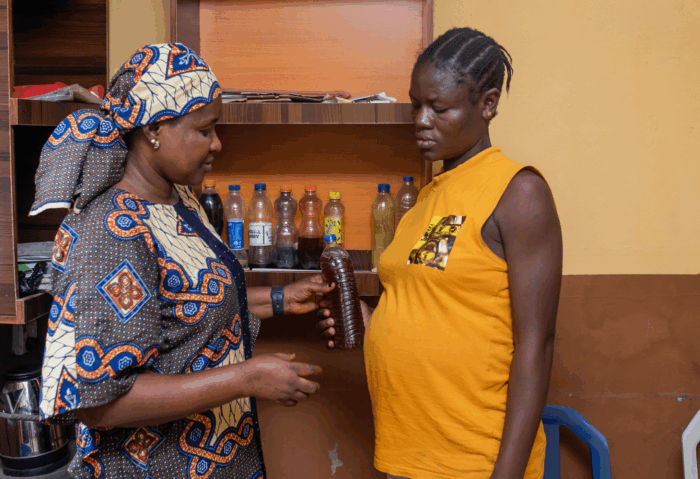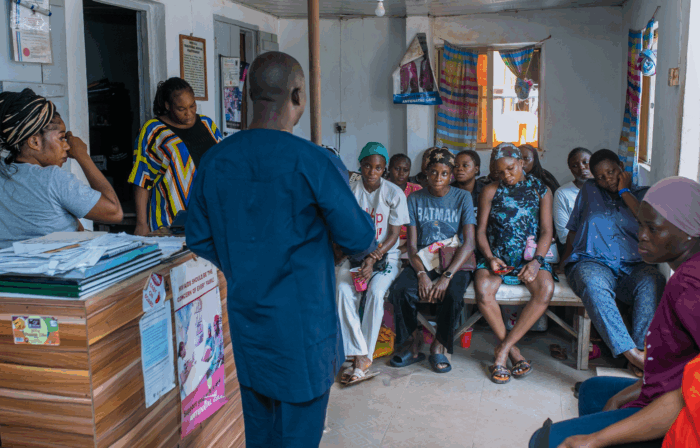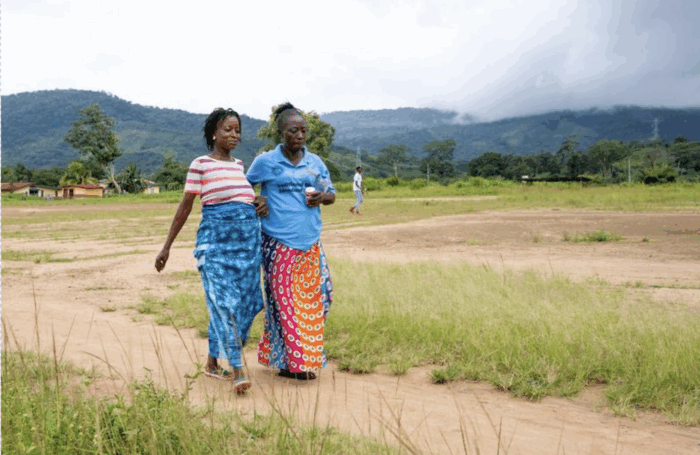Evolving The Role of Traditional Birth Attendants in Reducing Maternal Mortality

For the past two decades, the maternal health field has been laser focused on increasing the proportion of women who give birth in a health facility with skilled birth attendants – as the linchpin in reducing maternal mortality. While high-quality antenatal care is effective in identifying and monitoring a pregnant woman’s risk factors, unforeseen childbirth complications may still arise if not attended by a trained provider. That is why the World Health Organization (WHO) recommends that all women giving birth should be attended by professionally trained birth attendants who are able to manage an emergency, such as hemorrhage, if it should occur.
Increasing the proportion of births attended by skilled birth attendants (SBAs) is essential to meeting Sustainable Development Goal (SDG) 3.1 – aimed at reducing the global maternal mortality ratio to less than 70 per 100,000 live births by 2030. In fact, Every Woman Every Newborn Everywhere functions as a call to action to accelerate progress by setting a target that 90% of women give birth in a facility with an SBA by 2030.
Global advocacy on SBAs has been successful, and the proportion of facility births has increased significantly – from 61% in 2000 to 87% in 2024. However, progress has been uneven. Some countries are far behind the 90% goal, including Nigeria, which has the highest number of maternal deaths in the world and barely half (51%) of all births are attended by skilled personnel.
A large proportion of women – especially in certain countries and remote or rural communities – deliver without a SBA and continue to give birth with traditional birth attendants (TBAs). This is a large cadre of community-based birth workers who deliver babies outside the formal health system. While they are often known and well respected within their communities, their education and skill levels may vary, and they are not regulated by established systems.
Although there has been strong opposition to TBAs as part of efforts to increase facility births – including, in the past, banning them from delivering babies in Sierra Leone – the situation is not black and white.
Today, there is a growing recognition that TBAs are trusted community members and play an important role in a woman’s pregnancy journey – which should not be dismissed. In fact, when engaged effectively, TBAs can be an important piece of the puzzle in promoting safe motherhood.
Challenging assumptions about the role of TBAs
Local maternal health innovators are figuring out creative ways to leverage the influence that TBAs have in their communities. Strengthening Systems for Safer Childbirth is an MSD for Mothers-funded initiative to improve access to high-quality, respectful maternal health care in India, Kenya, Nigeria, and Sierra Leone. Six locally-led, multi-sector coalitions – composed of leading health care businesses, NGOs, technology companies, advocacy groups and national and local level government stakeholders – are strengthening health systems through a range of solutions to increase capacity for quality service delivery and improve maternal health outcomes.
As these coalitions work to address critical unmet maternal health needs within their communities, they have identified TBAs as a valuable resource for encouraging women to seek care in the formal health system and increase the likelihood of a safe childbirth. In Nigeria and Sierra Leone in particular, the coalitions have been working collaboratively with communities to better understand the deep-seated reasons (e.g., fear, mistrust of health facilities, lack of compassionate care) why women continue to seek care from TBAs. At the same time, they are engaging TBAs, recognizing their vital relationships with pregnant women and figuring out how to leverage these to increase referrals for timely emergency care – preventing maternal and newborn deaths.

Addressing barriers to referrals
In Nigeria, Project Aisha – led by Health Strategy and Delivery Foundation in partnership with the Institute for Healthcare Improvement, Ingress Health Partners and mDoc – is training TBAs to recognize warning signs of a pregnancy complication and make a timely referral to a health facility so women receive prompt medical attention.
In the Ifako-Ijaiye district, the team identified the leading contributor to maternal deaths: a weak referral system between the TBAs – who operate independently – and the major public hospital. In response, Project Aisha brought together individual TBAs and public and private health facilities to co-design a referral model that promotes timely referrals and improves access to comprehensive maternal healthcare.
By placing an emphasis on building trust between the TBAs and the hospitals, the new system overcomes longstanding barriers that hindered TBAs from making referrals. For example, the district is now using “silent” ambulances so that community members are unaware of where women are being transported from and, thus, do not judge the TBA and the care she is providing. Importantly, the Project Aisha team also addressed the negative attitudes that hospital staff had toward TBAs, reinforcing their critical role as ‘trust-brokers’ within the community and encouraging collaboration.
The combination of training, the new referral system and shifting attitudes has led to a significant increase in the proportion of prompt referrals of pregnant women with complications for expert care – from only 13% in January 2024 to 77% a year later.
Integrating TBAs as part of the clinical team
Wellbody – a multi-sector coalition in Sierra Leone led by Partners in Health Sierra Leone – understands the engrained reasons why women continue to seek care from TBA, such as fear and mistrust of health facilities. The team has worked with the community to preserve the respected role of TBAs while ensuring that TBAs understand why it is critical for them to become more closely connected with the health system.
Through the Wellbody Clinic in Kono district, the coalition has formally embedded TBAs into the care team, providing clear roles for them to both maintain the community’s trust and encourage women to give birth at a facility. For example, TBAs are being trained to promote health services for pregnant and breastfeeding women, accompanying them for prenatal, delivery and postnatal appointments, and linking them to the closest of five sites that provide quality antenatal, labor and delivery, and postpartum care.
Empowering TBAs with new skills has greatly improved referral practices. Before the program, TBAs usually made referrals only when the situation was dire, often too late to prevent a maternal death. Approximately one and a half years into the initiative, there’s a visible shift: TBAs are seen accompanying many more women in stable condition to clinics. During this period, TBAs have also made over 21,000 referrals to health facilities, including 1,740 for labor and delivery.
The “referral, referral, referral” mantra combined with growing community recognition that TBAs are effective health educators has empowered TBAs and incentivized them to refer women to care.
Adapting policies to meet communities’ needs
Developing policies that recognize the value of TBAs is important for realizing their potential as a community-driven solution to help reduce maternal and newborn mortality.
In Nigeria’s Kaduna and Lagos states, Project Aisha is advising the government on upskilling TBAs to identify women with high-risk pregnancies and warning signs for potential childbirth complications and make appropriate referrals. This guidance is shaping a regulatory framework and a new policy to help ensure that all practicing TBAs are registered, regularly trained in safe birthing practices, and provide timely data to the state about the services they delivered.
In Kono District in Sierra Leone, Wellbody has engaged TBAs to work alongside nurses and midwives, leveraging their trusted relationships with women to encourage and support them in accessing healthcare services, including referring them to primary and secondary health facilities as appropriate. Wellbody has also led the charge in delineating the roles that TBAs can and cannot play – a critical step in making sure that all members of the maternal health team are clear on their responsibilities in improving safe childbirth.
Both coalitions have recognized the value of TBAs, especially the emotional support and culturally relevant care they provide. They have invested in them as part of the solution in helping reduce maternal and newborn mortality in their community.
Considerations for national health leaders

TBAs – as a trusted maternity care workforce with strong cultural and community ties – can be an important part of an effective strategy to reduce maternal morbidity and mortality. We encourage national and local policy makers to recognize the value that TBAs have and invest in their potential to be partners in improving safe childbirth practices by considering the following recommendations:
- Recognize the TBA’s role and create clear policies on their scope of services: delineate the specific tasks that TBAs can perform (e.g., make referrals to skilled birth attendants) and those they cannot undertake (e.g., attempt to manage or handle obstetric complications or emergencies during childbirth) to ensure that TBAs, the communities they serve, and health care providers understand TBAs’ role in supporting safe childbirth practices
- Integrate TBAs into referral networks: formalize TBAs’ responsibilities within a high-quality referral system to help ensure standardization in referring pregnant women to a health facility for timely care
- Invest in building the capacity of TBAs to recognize danger signs in pregnancy: equip TBAs – in a culturally sensitive way – to recognize high risk pregnancies and warning signs of a childbirth emergencies so they can make appropriate referrals for these women to receive skilled care as soon as possible
- Employ TBAs to broker trust in the formal health system: leverage TBAs’ strong relationships within communities to help foster trust in the formal health care system – serving as an important bridge to encourage women to seek skilled care
The coalitions within the Strengthening Systems for Safer Childbirth initiative have shown that integrating culturally important traditions into evidence-based care can better meet the needs and preferences of pregnant women in low-resource settings. As country governments strive to increase the proportion of women who give birth in a health facility and meet the Sustainable Development Goal targets for maternal health, it is important to tap into community assets like TBAs for greater and longer-term impact.
About the authors:
Olasunmbo Makinde is the Senior Program Manager, Health Strategy and Delivery Foundation (HSDF)
Isata Dumbuya is the Director of RMNCAH (Reproductive Maternal Newborn Child and Adolescent Health) program for Partners in Health (PIH) Sierra Leone
Iyadunni Olubode is the Director of Nigeria Programs, MSD for Mothers
The activities in this publication were supported by funding from MSD, through its MSD for Mothers initiative and is/are the sole responsibility of the authors. MSD for Mothers is an initiative of Merck & Co., Inc., Rahway, NJ, USA.
